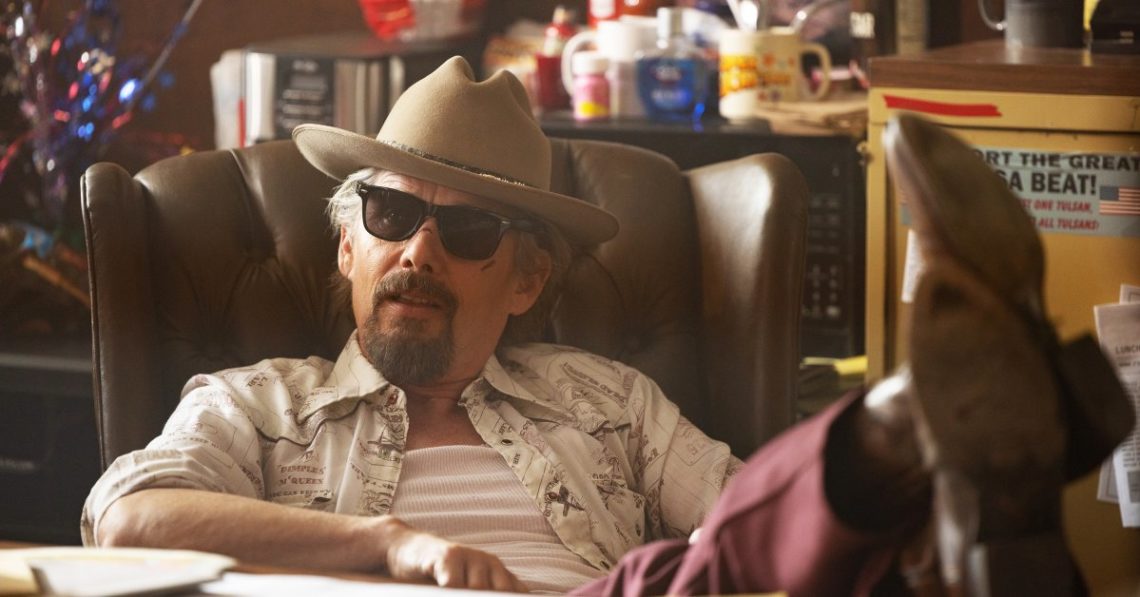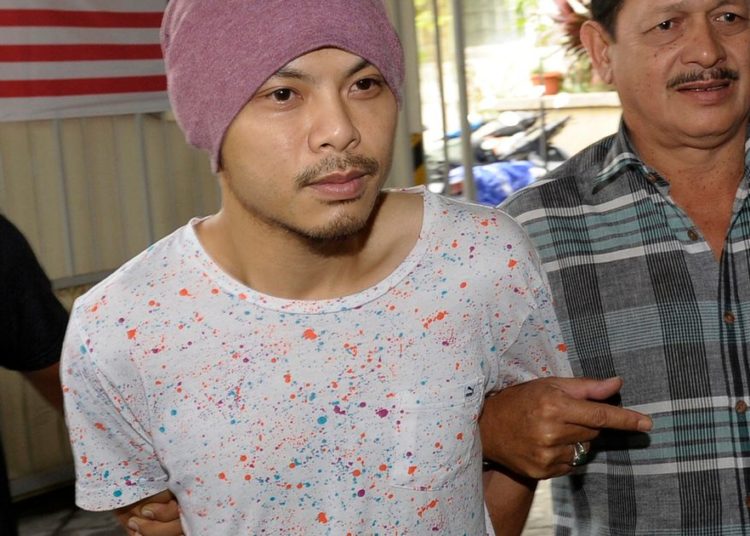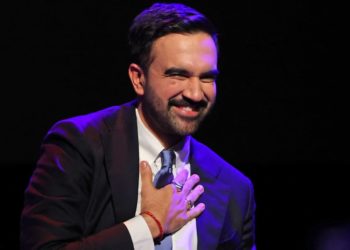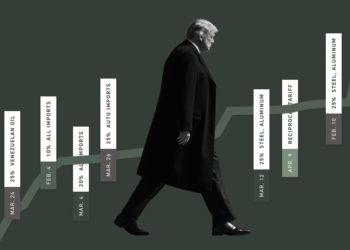This piece discusses, in detail, the finale of The Lowdown.
At the center of Sterlin Harjo’s excellent neo-noir The Lowdown, whose finale aired Tuesday on FX, were two big questions. One—how did Dale Washberg die?—was always going to have a straightforward answer. The other was more complicated. Sure, it sounded like a simple either/or: Is Lee Raybon a righteous crusader for truth and justice or a dangerously delusional white savior? (See also: no small number of this year’s most memorable movie protagonists.) But because Harjo, the creator of Reservation Dogs, understands how reductive the labels of hero and villain can be, Ethan Hawke’s wild-eyed “Tulsa truthstorian” turned out to be an equal mix of both archetypes. An even bigger surprise, for Lee and, I think, for most viewers, was that the man he identified as his nemesis ended up being no more malicious than Lee himself.
Titled “The Sensitive Kind”—which isn’t just a song written by J.J. Cale and featured in this episode via an Eric Clapton cover, or the headline on Lee’s cover story about Dale, but was also the working title for the show —the finale opens with a flashback that also feels a bit like a fantasy. Lee is in his bookstore, reading Walter Tevis’ novel The Man Who Fell to Earth, as Dale (Tim Blake Nelson) browses the shelves. (The book, which the filmmaker Nicolas Roeg adapted into a classic sci-fi movie starring David Bowie, follows a space alien who is tragically distracted by earthly frivolities from a mission to save his imperiled home planet. It also includes a human character who shares a name with Jeanne Tripplehorn’s Lowdown femme fatale, Betty Jo. In many ways, it’s her love that dooms the extraterrestrial protagonist.) Dale tells Lee that his journalism is “brave.” Lee explains to him what he means when he calls himself a truthstorian. “You know how they say there’s more to every story?” he says. “Well, that’s what I try to find.” Dale counters with a quote from Jim Thompson, the hardboiled Oklahoma writer whose books will be crucial in Lee’s investigation: “There is only one plot—things are not as they seem.”
When it comes to Dale’s death, they’re both right. As Lee realizes, there is more to the story than what authorities ruled, which is that the black sheep of the Washberg clan died by suicide—maybe over Lee’s exposé on the family. What he doesn’t see until the finale is how much he’s been misled by preconceived notions of who that story’s heroes, villains, victims, and perpetrators are. In other words: Things are not as they seem, even to a truthstorian.
After the cryptic bookstore scene, Harjo (who directed and, with Liz Blood, co-wrote the finale) returns to the previous episode’s cliffhanger, in which Lee bursts into One Well church and points a gun at Frank (Tracy Letts). Of course, he’s not the only armed person in a room full of militant white supremacists; soon, there are multiple weapons aimed at Lee. He only makes it out alive because Marty (Keith David) is right behind him with his own firearm, identifies himself as an undercover federal agent, and says he’s here to arrest Lee. The two men make it out alive, though Marty gets shot in the leg while they’re escaping. One of The Lowdown’s consistent pleasures has been its comic action sequences, and this caper is a real showcase for David, from his pronouncement that Lee is “insane and a complete asshole” to his floppy, tripped-out reaction to the “bovine vagina muscle relaxer” Lee assures him is just like Advil.
Back at the bookstore, the hilarity gives way to a confrontation that shakes Lee to his core. The Native American artist Chutto (Mato Wayuhi) throws a rock through the window and, when Lee chases him down, lays into Lee for getting his grandfather, Arthur (the late Graham Greene), killed. “You don’t think about anybody but yourself,” Chutto says. When Lee offers to make things right by helping the family get back the land stolen from it generations earlier, Chutto replies: “I don’t give a f-ck about the land… It’s people like you—they want it. It makes you sick, and you kill people because of it.” This is Chutto forcing Lee to see something he’s been blind to: his own complicity, as a brash, self-righteous white guy, in a war over land and principles that is ultimately less important than the will of the people who become collateral damage. The idea that Lee’s perspective is limited by his privilege suggests itself again when he remarks to Marty that he was surprised to see the powerful philanthropist Trip Keating (Tom McCarthy) at One Well. “That’s exactly the type of guy you expect to see in a room full of Nazis,” Marty says.
Whether out of unconscious sexism, his infatuation with her, or both, Lee was catastrophically wrong in assuming that Betty Jo was an innocent victim in the Washberg affair. Arthur is dead because Lee confided in her about Dale’s will and she turned out to be in cahoots with Frank, who is also to blame for Dale’s murder. He’s the one who dispatched the two white supremacist goons to the couple’s home; they were only supposed to scare Dale, but in their incompetence, they took his life. With the damage done, Betty Jo staged her husband’s death to look like a suicide. When Lee confronts her, she protests that every awful thing she did was in service of keeping herself and her daughter, Pearl (Ken Pomeroy), safe. “I’ve done everything I can to help the people I love,” she insists. It’s as quintessential a portrait of white women’s complicity in white men’s violence against Indigenous, Black, and other oppressed people as you can find.
Betty Jo does make one solid point, though, when Lee defends his own pure intentions. “If you do something good and it ends badly every time,” she asks, “is that really good?” Lee has been chasing the truth at all costs. But shouldn’t said costs sometimes be prohibitive? What if that once-in-a-lifetime work of investigative journalism, the one sure to bring glory upon the writer’s name, will also have dire consequences for someone who could otherwise do a lot of good?
In this case, that person winds up being the man Lee was so eager to cast as his nemesis: Donald Washberg (Kyle MacLachlan). When Marty takes Donald to meet with Lee at Cyrus’ (Mike ‘Killer Mike’ Render) office, walking the gubernatorial candidate through a barbecue populated by Black constituents he hasn’t bothered to acknowledge in his campaign, we see that Donald knew nothing about Dale’s murder. He really did think it was a suicide. As for his planned sale of Arthur’s family’s stolen land to One Well (or, as Lee puts it, the “psycho Nazi church”) at an exorbitant price, Donald’s mistake was nothing more sinister than a disinclination to look a gift horse in the mouth. “I didn’t want to know,” he tells Lee, looking absolutely crushed by his role as Betty Jo’s unwitting informant and protector. “I thought I could make it right when I got elected… I hurt people. I hurt my brother.” Lee commiserates: “I hurt people, too.”
Donald was never the villain to Lee’s hero; both are, in the end, well-meaning men who chose to tune out information that would make it harder for them to achieve their respective aims. For Lee, that aim was to publish the article he titled “The Murderers of Dale Washberg”—a piece that he now realizes would ruin Donald’s campaign by making it appear, falsely, as though he knowingly accepted a bribe from One Well. So, presumably with Chutto’s and Betty Jo’s words in mind, he uses his leverage to do something more important than his truthstorian’s work. He strikes a deal with Donald to return the land his ancestors plundered to Arthur’s family, who in turn transfer its ownership to the Osage Nation. Donald announces the decision at a press conference surrounded by Osage leaders and musicians, where he also vows to respect tribal sovereignty. “There’s a lot more tribal citizens than CEOs,” he tells Trip, in a delicious kiss-off.
In a shot so brief it would be easy to miss, Donald gets a hearty hug from Pearl—who now knows that he’s her biological father. This is something else that he and Lee have in common: They’re both dads who have prioritized their own ambitions over their daughters’ needs. But in the finale, we see Lee making progress as a parent, too. Last week’s episode saw him storm out of Francis’ (Ryan Kiera Armstrong, now one of my favorite young actors) parent-teacher conference, offering her an infuriating explanation for his behavior. He was not, he proclaimed, going to be the kind of father who attends all his kids’ sports matches. “I’m going to parent you by trying to show you what a good man looks like,” he said. “I am going to show you how to follow your dreams.” Francis’ response—“I just want you to be my dad”—was heartbreaking. Why did everything always have to be about him? We know she got through to Lee when he shows up, this week, at her reading and listens to the vignette she wrote about his split from Francis’ mother, Sam (Kaniehtiio Horn).
As the finale’s action winds down, he suppresses his resentment of Sam’s fiancé, Johnny (Rafael Casal), for long enough to support her and their daughter at the couple’s wedding. (Leonard Cohen’s “So Long, Marianne” is an awfully ominous song to walk down the aisle to, though it couldn’t be more appropriate as a soundtrack for a man watching the ex-wife he still loves marry someone else.) And in one last act of selflessness, he grants Francis his blessing to move in full-time with Sam and Johnny. “You deserve a stable environment,” he says. She isn’t entirely convinced, but the point is that the decision should be hers to make, not Lee’s.
His decisions to put his daughter’s needs before his own and to scrap “The Murderers of Dale Washberg” in favor of “The Sensitive Kind,” the return of Osage land, and Donald’s pledge to the tribal nations in Oklahoma constitute the development of sensitivity on Lee’s part. The people he loves are no longer relegated to supporting characters in The Lee Show, welcome to participate in his obsessions but unlikely to see him reciprocate their interest. As Dale noted, sensitivity isn’t just a synonym for softness; it means that a person is “quick to perceive things.” Too many crusaders for truth and justice lack this quality, so wrapped up are they in egotistical visions of their own heroism. They can be more loyal to principles than they are to people, more likely to trust their self-centered instincts than to follow evidence that contradicts them.
Not everything in this finale worked perfectly for me. Donald’s vindication, after so much slimy behavior, felt abrupt. I also would’ve liked to see more of a resolution for Marty, whose moral ambivalence was so thoughtfully explored through his failed date. On the whole, though, I came out of The Lowdown not just persuaded, but also moved by Harjo’s case for “the sensitive kind.” The evil of plunderous bigots, whether they happen to be the so-called pioneers of centuries past or the white separatist fanatics of today, may be eternal—but so is goodness. And it’s not something a lone, self-anointed savior can simply claim for himself, as Europeans did tribal land. It’s something those who believe in it have to work for, in community with people of differing experiences and worldviews, to develop the sensitivity that positive change demands.
The post The Lowdown‘s Finale Brilliantly Upends the Characters’—And Audience’s—Assumptions appeared first on TIME.




